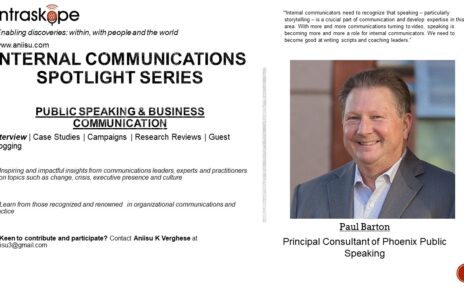Carving a niche and being your best in an evolving world can be challenging. Without a clear purpose and strategy for your personal branding journey you can lose your way very quickly. Moreover, there are several myths about personal branding that cloud how people approach this topic. Many go about building reputation and credibility assuming a personal brand can happen overnight. They attempt linking self-branding to net worth, expect an online presence to have an impact or think that just networking can lead to positive results. Nothing can be more off the mark. Take for example these research study findings.
- “Less than 15% of people have truly defined their personal brand and less than 5%are living it consistently at work – each and every day” – (Glenn Llopis Group, 2013)
- “33% of companies use social networks to research potential job candidates” (New CareerBuilder Survey, 2012)
- Most people develop a personal brand on Linkedin profile for careers and job opportunities (LinkedIn and Personal Branding – Post Road Consulting, 2016)
- “7% of US under graduates choose a major from among the humanities, choosing instead for market focused majors such as petroleum engineering and pharmaceutical marketing” (Time, November 7, 2016)
- “45% people don’t even think about their own personal brand. You won’t become known and respected in your company if you don’t know the unique value you provide and how to connect that value to your company’s overall mission.” – Monster.com
This indicates a gap in how people perceive personal branding and the amount of effort they take to build it. The rise of personal branding is attributed to the erosion of trust in corporations and the shift to believing individuals more. Likewise, we hear of more and more people starting our enterprises on their own, the one-person firms. Undoubtedly, personal branding is gaining ground and is crucial for careers and networking. Recruiters seek candidates that are tenured, committed, have proven skills and with strong networks.

To stand apart in an already crowded space one needs to work with a strategy that focus on specialization. In Trout on Strategy – Capturing Mindshare, Conquering Markets (Tata McGraw – Hill, 2004), the author advocates sharp positioning – “Specialization lines up with where the world is going. The specialist has a chance to nail down a field of expertise as a differentiator. It is better to be exceptional at one than good at many things”. This means one needs to begin with their purpose in mind. Write up in a single sentence about what you stand for and how you will build expertise, add value and reinvent yourself for the world. It can cover ways you will measure your impact.
With that context I recommend a three-pronged approach – which I call the 3C Model to Personal Branding: Clarity, Commitment and Consistency with the strategy to a) build expertise b) add value c) reinvent yourself. The connecting thread is communication, that helps share progress as one builds their personal brand.
How does this work?
• Building expertise is related to gaining mastery over one area and continually investing time and mindshare. Writer Malcolm Gladwell writes in his book Outliers about being world-class by growing in strength through ‘the 10,000 Hour Rule —10,000 hours of “deliberate practice”.
• Adding value is about ‘giving’ in ways that improves the lives of others. That can take the shape of knowledge or assets that you create that benefit society at large. Or actions which you do that overcomes gaps and makes lives easier and simpler. Scholar Adam Grant, in his book – Give and Take makes a case for people to be ‘givers’ rather than ‘takers’ – “success depends heavily on how we approach our interactions with other people. Every time we interact with another person at work, we have a choice to make: do we try to claim as much value as we can, or contribute value without worrying about what we receive in return?”
• Reinventing yourself means that we keep our purpose alive and strive to be better every day. You need to constantly have your finger on the pulse in your area of expertise. Look at trends shaping the space and recalibrate your direction. Daniel Pink refers to Motivation 3.0 in his book Drive where “humans also have a drive to learn, to create, and to better the world.”
When one blends these with Clarity (purpose and focus), Commitment (authenticity and credibility) and Consistency (learning and growing) there is a much greater chance of succeeding with your personal brand.
A personal brand can be built as an individual or while you work in an organization. The opportunities to build a brand exist within and outside – so don’t limit yourself while thinking about the possibilities.
How does one know when a brand is getting built? The best way is to seek feedback and listen intently to messages you receive. Do they relate back to your purpose and the approach? Are the messages aligned with what you want to convey? Do people seek you out on the specific domain you have expertise in?
Tom Peters, whose article ‘The Brand Called You’ originally coined the term personal branding had this to say: “You are a brand. You are in charge of your brand. There is no single path to success. And there is no one right way to create the brand called You. Start today. Or else.”
You can also look up my You Tube Channel and the presentation on Slideshare.
Does this resonate with your idea of building a personal brand? Keen to know what you think?

